Do I Really have to use RODI Water?!
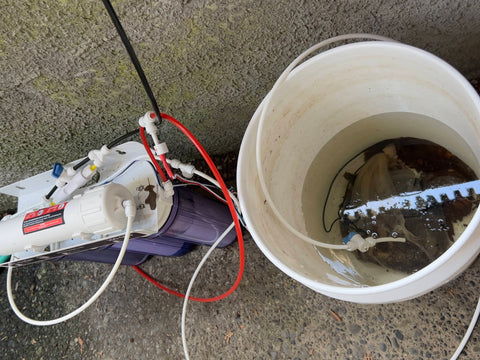
What is RO Water and How is RO Water Made?
RO water is water which has been treated or purified through the process of reverse osmosis. Reverse osmosis is a process in which pressure forces water through a semipermeable membrane, separating water into two streams: treated water and rejected water. Treated water passes through the membrane while larger contaminant molecules get trapped and discharged in the rejected water. The treated water is pure H20 that is ready to drink. RO systems remove contaminants such as heavy metals, chemicals like chlorine, buffers in the water, and bacteria living in the water. The treated water will come out of the unit crystal clear with a low TDS, a pH very close to 7, with noticeably low levels of carbonate hardness and acids present. Pure H20. Aquarists who want to use RO water in their aquariums can install a point-of-use reverse osmosis (RO) system in their home or purchase the water from a local fish store. Now that we know what RO water is, why on earth would you want to use it? And how is it so good for blackwater aquariums?!
Benefits of RO Water in Aquariums
Some people may install RO systems if they live on city water or in areas with poor water quality because they don’t enjoy the taste, or their tap water requires extra steps of purification. Afterall, the water which passes through the semipermeable membrane is free of 95-99% of dissolved minerals and other solids. Aquarists love this because it enables us to create aquarium water from a source that is ridiculously pure, but also water that is receptive to the acids and bases we may want to add. This pure water allows us to add back in bases if we need to make water for hard water fish like Lake Tanganyika Cichlids, or it allows us to add in botanicals for fish that prefer acidic environments, like B. Macrostoma. Reverse osmosis is also useful if you are on well water, which can frequently be contaminated with minerals such as iron and sulfur from the surrounding sediments, RO water will help remedy this issue as high amounts of iron can lead to algae.
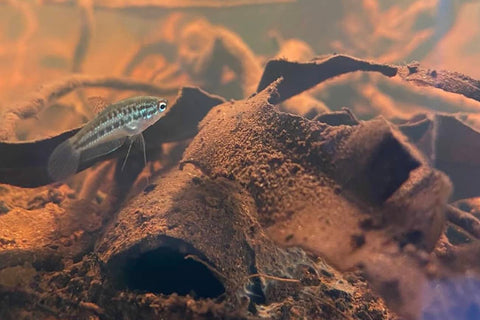
Photo by @CD_Scapes
If your RO system has a carbon filter, the treated water won’t even need a water dechlorinator before going into the aquarium! This can save you some money during water changes, helping you offset the cost. Additionally, since many dechlorinators come in plastic bottles, you are also cutting down on plastic waste! It is incredibly important to note that most tropical fish in our hobby thrive in a very wide range of pH values, and it is always more important to maintain a constant pH than one that fluctuates continuously. What we mean here... is that if you are quite motivated to use your RO system in the beginning, but then get lazy setting it up and flip flop back to tap water, you are subjecting your aquatic ecosystem to different types of water which may impact your ecosystem. After reading this blog, we encourage you to commit to one way or the other!
How Efficient are RO Systems?
Unfortunately, many home RO systems are inefficient. RO systems can generate five times more rejected wastewater than safe, treated water, and some systems can generate up to 10 times more wastewater. As technologies improve, some RO system manufacturers advertise a 1:1 ratio of rejected water to treated water, but this efficiency comes down to better membranes which help improve water efficiency. Do your research before installing a point-of-use RO system in your home; look for the WaterSense label for better water efficiency.
Most reverse osmosis systems require you to change the filters and membranes yearly, and this interval is dictated by the starting point of your tap water. The harder your tap water, the more mineral rich, and the more it will get trapped in the membranes forcing you to replace them. Replacement filters can be a bit pricey depending on your system, although some services and manufacturers offer deals on replacements. Consider these additional costs before installing an RO system in your home.
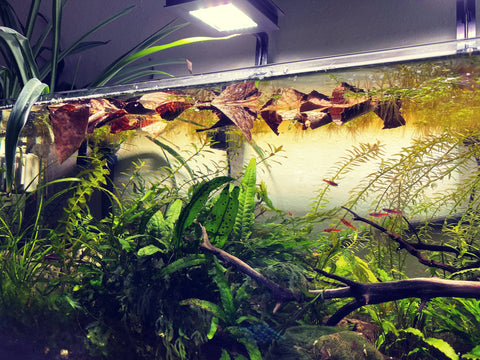
A good middle ground if you are looking to begin using RO water is to find an LFS that will sell you RO water. They usually offer it in 5-gallon quantities.
What Kind of Aquarium Benefits most from RO Water?
The type of aquarium which is going to benefit most from RO water is one where the fish you are keeping will not thrive in the water parameters of your tap water. For example, Betta Botanicals is located where a lot of homes have well water, with pHs of 7.8, TDS of 300+, and carbonate hardness of 5+. If we added botanicals, heck, if we added peat moss to the water, we could not get the pH down enough for our acid-loving betta fish to thrive. Therefore, many hobbyists in this area use RO water either from their point of use RO unit or from purchasing at their local fish store. Now, depending on your aquarium style, reverse osmosis water may or may not be for you. Consider the following before you purchase RO water or install an RO system in your home:
- What are the water parameters of your home tap water?
- Are you trying to achieve a specific water chemistry?
- Are any of your fish, plants, or invertebrates especially sensitive to water hardness or swings in pH?
RO Water for Freshwater Aquariums
The acidic compounds released by botanicals as they decompose in your aquarium can quickly lower your pH when using RO water, unless you add back in a small amount of carbonate hardness. Lowering or completely removing your carbonate hardness removes the buffering capacity of your aquarium to pH swings, which some fishkeepers may not prefer, depending on their aquarium style. However, blackwater aquarium enthusiasts may prefer RO water because of its low carbonate hardness and ability to achieve an extremely acidic pH when botanicals are added. Blackwater aquarists try to achieve specific water chemistry in their aquariums, including a pH lower than 7, low carbonate hardness, and low tds (total dissolved solids). Some wild bettas such as Betta Hendra are found in blackwater ecosystems with a pH of 3.5 or lower, and the only way you will get down to that pH is by using RO water!
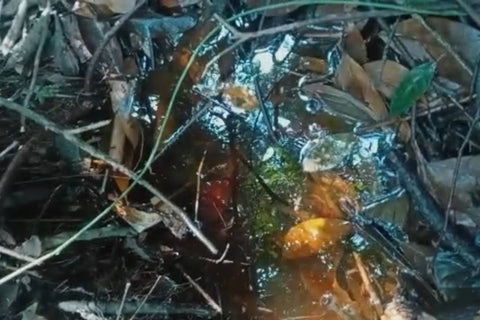
Aquarists that keep heavily planted tanks may not want to use RO water for their aquarium maintenance because many minerals and nutrients are removed from the water during the reverse osmosis process. They become unavailable for your aquatic plants to use as nutrients, and it is required that you remineralize the water with both a carbonate buffer and a micro- and macro- nutrient supplement.
Now That You Understand Reverse Osmosis, Will you Use it?
Reverse osmosis water is a great option for aquarists of all experience levels, but only after you've conducted proper research. Not only can RO water benefit your aquarium’s ecosystem by allowing you to change the pH to your fish's ideal range, but it can also make the water in your home cleaner, safer, and better-tasting. However, RO water isn’t for everyone. Depending on your aquarium style or fishkeeping method, you may determine that you don’t need it if your tap water is already low in carbonate hardness and has an ideal pH, or if your fish thrive in the water parameters that your tap water already has. At Betta Botanicals, we highly recommend trying RO water in your aquariums if you’re a blackwater enthusiast, or keeping any fish that prefers incredibly acidic/basic environments. If you aren’t ready to take the plunge and install a home RO system, remember that you can always purchase reverse osmosis water from your local fish store, or buy distilled water from your grocery store. When you’re ready to build your ecosystem, we have your back with the botanicals you need to build an ecosystem! Good luck, and happy fishkeeping!




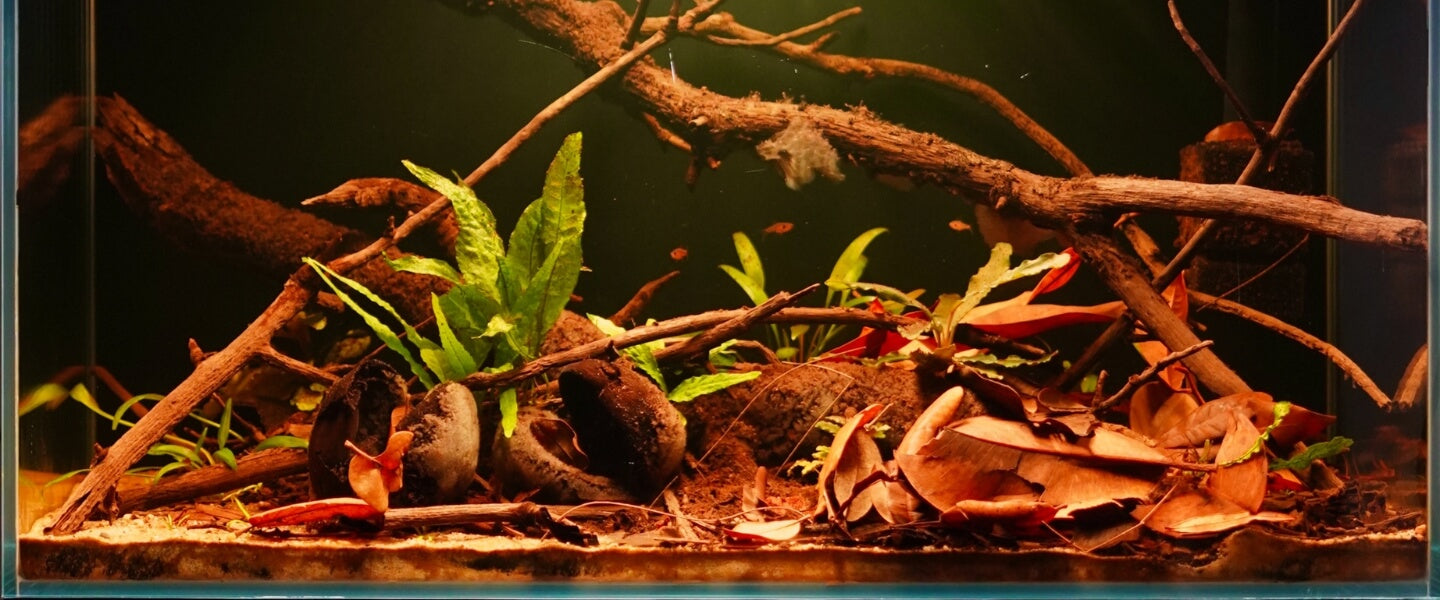
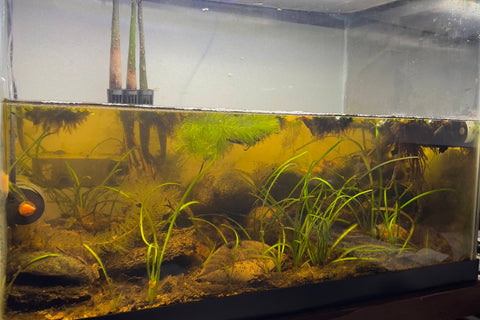



Inspire your friends:
How to Naturally Lower the pH of Your Aquarium
What are the Ideal Temperatures for Betta Fish?